Niagara Falls Visitors Guide
This Whirlpool State Park guide is a part of our Niagara Falls Guide, a comprehensive look at The Falls, top attractions, and other awesome parks in the region, with a focus on photography and nature.
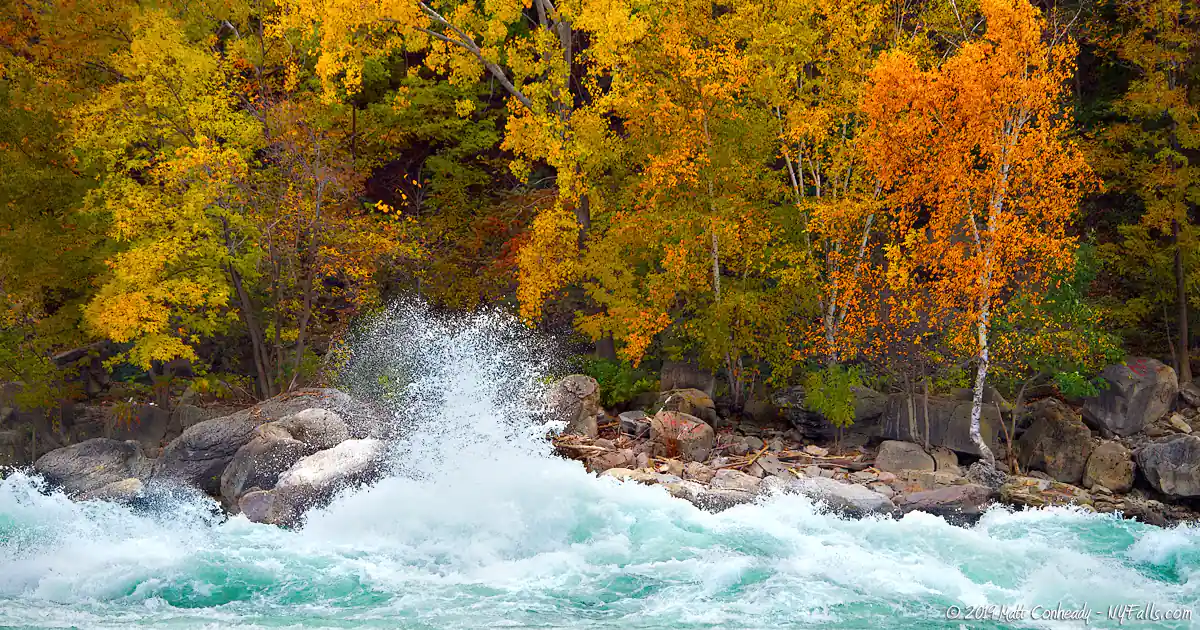
This Whirlpool State Park guide is a part of our Niagara Falls Guide, a comprehensive look at The Falls, top attractions, and other awesome parks in the region, with a focus on photography and nature.
Location: Whirlpool State Park is located on the American side of the Niagara River, just a few miles north of Niagara Falls, near Lewiston, in Niagara County, New York. It is located to the south of Devil’s Hole State Park and to the west of Deveaux Woods State Park.
Maps: Google map; Topographic; Interactive map
GPS Locations:
Directions from the south (Niagara Falls): Take the Robert Moses State Parkway north.
Directions from the north/east: use Google Maps.
Parking: Parking is available in the large lot at the park entrance. There is plenty of space for nearly 100 cars. Alternative parking can be found to the north at Devil’s Hole State Park. If parking at Devil’s Hole, just walk south along the Robert Moses Parkway to Whirlpool State Park (10 minute walk).

Note: Whirlpool State Park is adjacent to Devil’s Hole State Park, and shares many of the same trails and views. Review both locations before visiting.
Seasons/Hours: Whirlpool State Park is open year-roung. Sections of the gorge trail may not be accessible (or safe) during times of heavy rain or snow. The restrooms are open from mid-April through late October. Dawn to dusk, and because the gorge lacks any lighting, we highly recommend giving yourself enough daylight to get back out.
Admission: Devil’s Hole and Whirlpool State Parks are FREE to all visitors.
Best time to visit: Autumn for the foliage and fishing. Winter for Fishing. Summer to get away from the tourist crowds at the Falls.
Time: few hours.
Handicap accessibility: Yes, the restrooms and overlook are. The gorge is not accessible.
Pets: Household pets are allowed. They must be caged or on a leash not more than 6 feet. They are not allowed in the restroom and it is best not to let them swim in the water. There have been several cases of dogs slipping on the gorge trail and falling to their deaths. We highly recommend against bringing your pet on the trail.
State Park amenities: Restrooms, fishing, nature programs, hiking, pavilions, picnic tables, playgrounds, cross-country skiing, bicycling.
Swim: Swimming in the Niagara River at this park is not allowed and can be deadly.
Boat launch: This park is not equipped with a boat launch. For launching, visit Fort Niagara State Park or the public marina in Lewiston.
Fishing: Both Whirlpool and Devil’s Hole State Parks offer some of the best fishing in the Niagara Region. Fishermen cast from shore or boat down from the northern launches to the Robert Mosses Power Plant to harvest massive salmon and trout amid the grand sights of the gorge and rapids. Winter steelhead fishing has become increasingly popular and is probably the reason for most winter visits to this park. The hike down and then up the gorge can be grueling, so pack light and bring a partner for safety.
Accommodations: Restrooms are located at the top of the gorge at both the Whirlpool park and Devil’s Hole entrances. A playground is near the pavilion at Whirlpool State Park. Historic and Natural History signage can be found throughout both parks.
Difficulty: Easy to difficult. Walking along the Gorge Rim Nature Trail is easy. The trip down into the gorge is a rough one.
Markings: Trails are well established. Most segments are labeled with colored paint marks on trees or boulders.
Distance: A winding stone stairway heads 300 ft down into the gorge, which connects with the several mile long gorge trail. A loop from the Whirlpool State Park parking area, down into the gorge, back up at Devil’s Hole State Park, and then back to Whirlpool Park is roughly 2.5 to 3 miles (marked in Blue on the map below). We have expanded the trail guide with optional extensions (to see more of the whirlpool) for this park with up to 5 miles of trails. These extensions are marked in Red and Orange. For the abbreviated trail, see the guide for Devil’s Hole State Park.
Description: The Ongiara Trail is an excellent opportunity to experience Whirlpool and Devil’s Hole State Parks and get a good workout at the same time.
Map: Click here.
Park is one of the more interesting parks that are strung along the Niagara River on the New York side. The park is located along the upper Whirlpool Rapids, a dangerously turbulent stretch of the Niagara River downstream from Niagara Falls. Here the gorge walls pinch the river, forcing massive amounts of water through a smaller space and creating dangerous Class V whitewater. The Whirlpool rapids generate exhilarating waves for sport-craft and highly oxygenated water for large sport fish. In fact, the fishing here (especially for trout and salmon) is so spectacular, major fishing journals and television shows have called this one of the premiere freshwater fishing locations in the country.
From the entrance off of the Robert Moses State Parkway the level lawns and scattered picnic tables overlook the tree-covered gorge, white water of the upper rapids, and the massive natural phenomenon known as the Niagara Whirlpool. A single stone stairway, in dreadful condition, leads 300 feet down into the Niagara Gorge. Intimidating? Only if you are out of shape. Take the journey. Whirlpool and neighboring Devil’s Hole State Parks are filled with beautiful sights all the way down.
The Niagara Whirlpool, with its 125 ft (38 m) deep swirling waters is the result of the dramatic turn in the Niagara River’s flow (nearly 90 degrees), as the river changes to follow and ancient debris-filled valley (St Davids Gorge). As the Niagara River formed, it crossed with this buried valley and abruptly turned to fill and follow it, quickly cutting away the soft dirt and stone filling. The collision point at which the Niagara met the old valley became the Whirlpool, and the jutting out of the pool is due to the erosion on the ancient river bed in the other direction. For more information on the formation of the Niagara Gorge and the Whirlpool, check our FAQ.
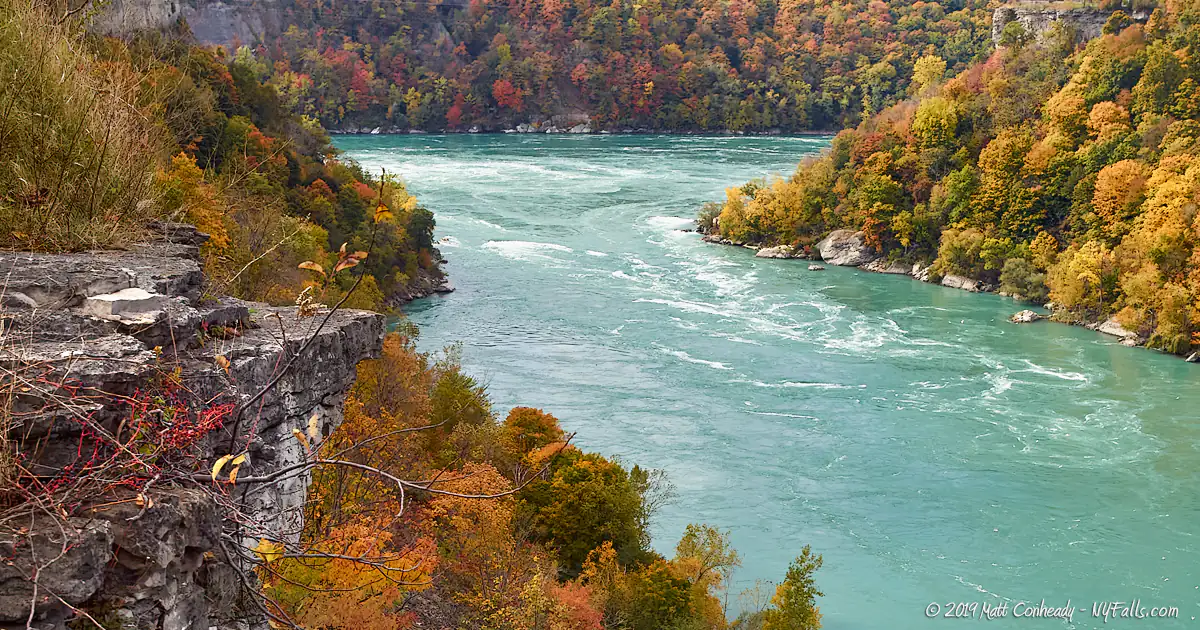
When standing next to the Whirlpool, the roar of its turbulent white water easily drowns out the rest of the world. During the day (specifically in summer), the flow is greatest as the power plants divert most of the water at night and during the tourist off-season. As water is pinched through the narrows of the gorge just upstream, it increases in speed and jets into the Whirlpool, mixing and swirling in a seemingly circular direction around the contours of the gorge and eventually making its way out after a 90 degree turn. It seems that simple, but the flow is actually more complex, and even changes based on the time of day. See below for more information.
Although the white water present here looks great for sport, it is extremely dangerous. Personal craft is prohibited, and only the Whirlpool Jet Boats Tours mix it up with close proximity to the swirling pool. The chaotic upper rapids, with its 11 ft standing waves, feed the Whirlpool and are most likely accessible one way…from upstream and not voluntarily. As the water exits the Whirlpool and flows into the wider reaches of the gorge near Devil’s Hole, it begins to slow. Boats, Jet-skis, birds and fish have little problem navigating these lesser rapids.
Across from the New York park is the Canadian Niagara Glen-View Park, an equally amazing adventure in its own right. It features more Whirlpool-adjacent shoreline, as well as much better maintained facilities, including an elevator that takes visitors down to the “White Water Walk” boardwalk along the upper rapids. The Canadian side also features the Spanish Aero Car, operating since 1916, which takes passengers 250 feet (76 m) above the Whirlpool, from one side and back along its 6 inch-thick steel cables. You can’t ride it from the American side, but you can see it, and it makes for great photos.
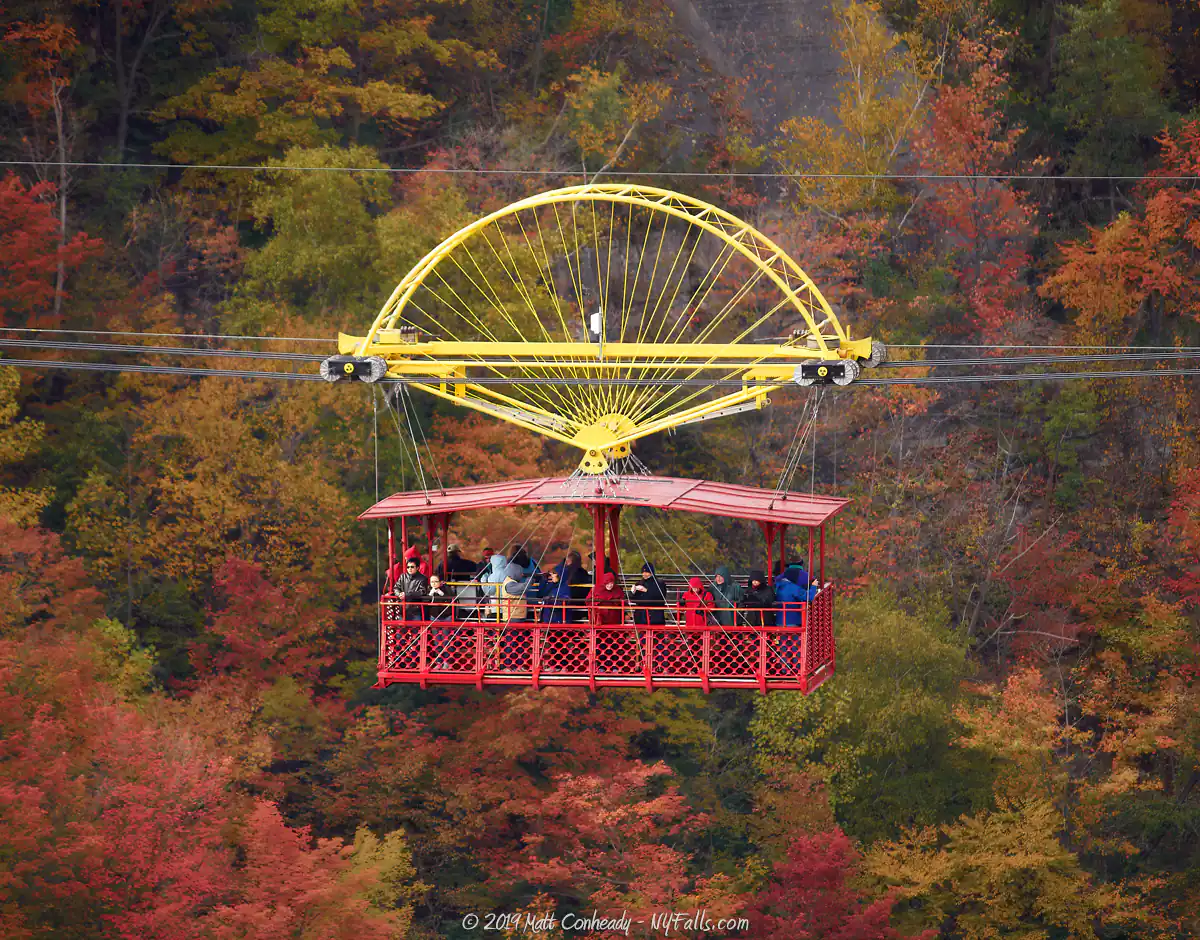
An old rail-bed, that seems dangerously close to the rapids, now serves as a trail that connects the Devil’s Hole steps to Whirlpool State Park to the south, and creates an excellent looping trail. When hiking this trail, imagine the renaissance of Niagara tourism in the 1920’s when passengers would brave the dangers of the rockslides and deadly water, as they paid less than a dollar to ride this close on a steel trolley. (Not only did rockslides kill passengers and some crew on this line, but the resulting damage led to its demise).
Despite the intimidating name, and proximity to certain death, the park is harmless for those that play safe, and certainly should not be avoided. The small sense of danger, amazing sights and excellent hiking opportunities make this and the adjacent Devil’s Hole State Park an excellent adventure for the family and a great getaway from the tourist-filled Niagara Falls Reservation Park. Bring your fishing pole, camera, and a picnic lunch and make a day of it.
What are all the helicopters and people in bright orange jump-suits doing around?
This section of the gorge, with its risky trails and constant rock slides is a dangerous one. Often people will slip, fall, or jump in and need rescue. The Whirlpool also acts as a natural trap for floating debris from upstream (yes, people can be debris too), and this is a crucial time to save them. The local governments, in cooperation with local helicopter tourism companies, and the Whirlpool Jet Boat Tours, run regular rescue drills to keep their skills and knowledge of the terrain sharp for when they are needed.
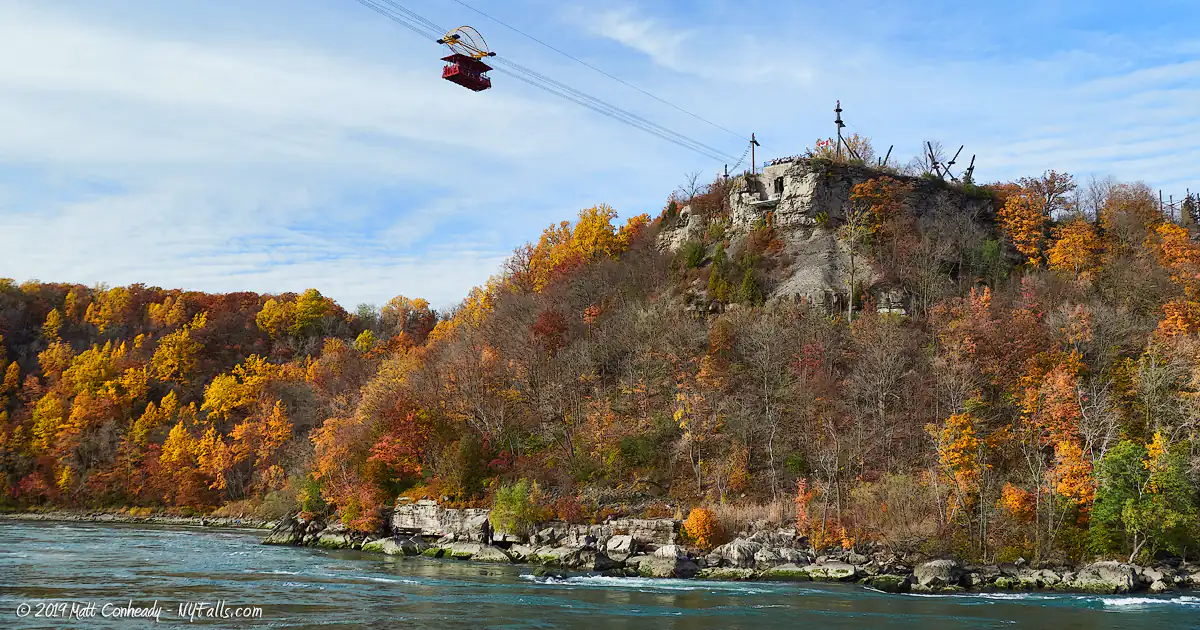
7,500 years ago | – | Niagara Falls carves out the Niagara Gorge as it recedes south. Around this time the Falls intersected with the ancient St Davids Gorge and carved out the Niagara Whirlpool. For more history of the Falls itself, see the Niagara Falls Historical Timeline. |
1887 | – | Municipal park architects Frederick Law Olmsted and Calvert Vaux devise a plan to establish several parks along the Niagara River, including Devil’s Hole and Whirlpool. |
1895 | – | The Niagara Gorge Belt Line Railroad opened The Great Gorge Route, carrying passengers along the Niagara River from Niagara Falls, NY to Lewiston, passing right by Devils Hole and the Niagara Whirlpool. It quickly becomes one of the most popular tourist attractions at Niagara. |
September 13, 1935 | – | A major rock slide, one of many that plagued the line, closes the Niagara Gorge Belt Line Railroad permanently. |
2001 | – | Two of the four lanes of the Robert Moses State Parkway are closed (on a trial basis) and designated as multi-use trails. Diminishing tourism in the Niagara region and decreased use of this scenic byway allow for the closing. |
It is easy to picture the flow of the nightly Niagara Whirlpool to be a straightforward circular or looping direction, but it is not that simple.
The direction and pattern of flow is dependent on the amount of water that flows into the Whirlpool from Niagara Falls. This flow is continually regulated by the hydro-electric power plants along the River, and when the sun is down, or the tourism season is over, the flow over the Falls and into the Whirlpool is drastically cut (by 50%), and the direction of the Whirlpool actually reverses.
During the day, more of the power of the Niagara is needed to please tourists at the Falls and less water is diverted for the plants. Water jets out of the upper Whirlpool Rapids and cuts across the Whirlpool near the surface. It then follows the contours of the shoreline, in a counterclockwise direction and when it reaches the whirlpool entrance again, it sinks and passes under in the incoming flow and heads out towards the lower rapids.
From 9 pm to 8 am, the flow of the Falls is cut and the water at the Whirlpool dips drastically (up to a 10 ft drop). The change in volume changes the pressure of the water in this semi-closed system and thus the dynamics of the flow changes. The Whirlpool reverses direction and flows clockwise, loosely following the contours of the shoreline.
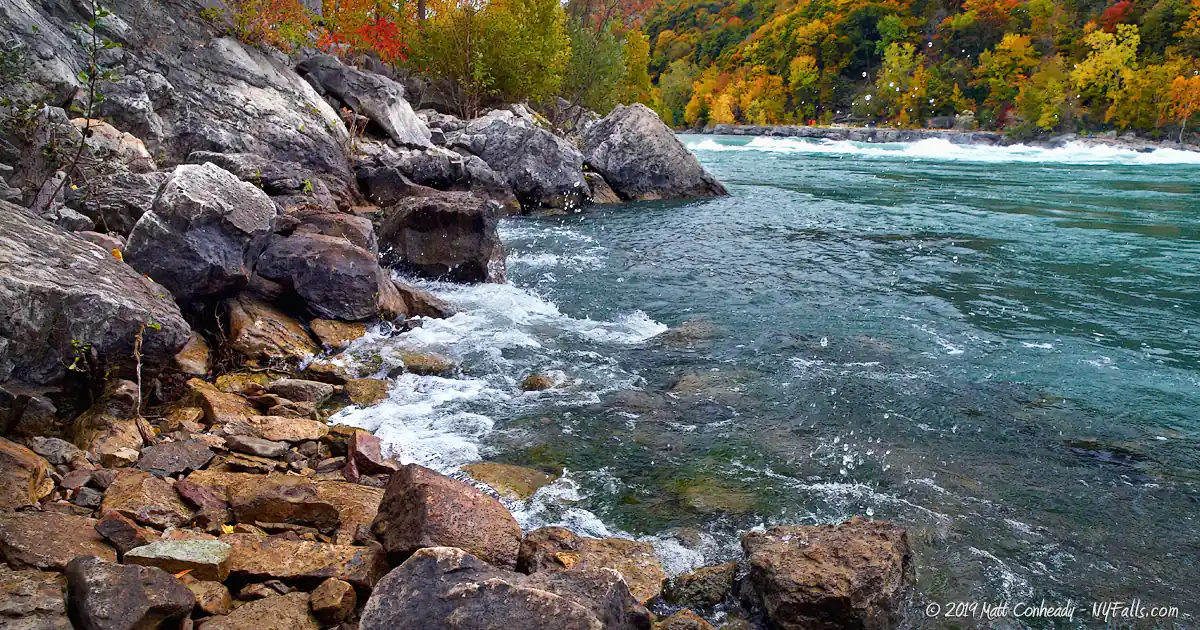
Whirlpool State Park
c/o Niagara Frontier Region
PO Box 1132,
Niagara Falls, NY 14303
Phone: (716) 284-5778
nysparks.state.ny.us